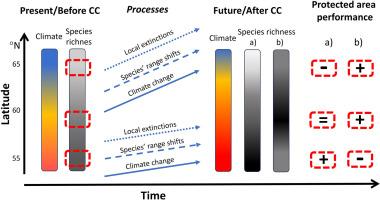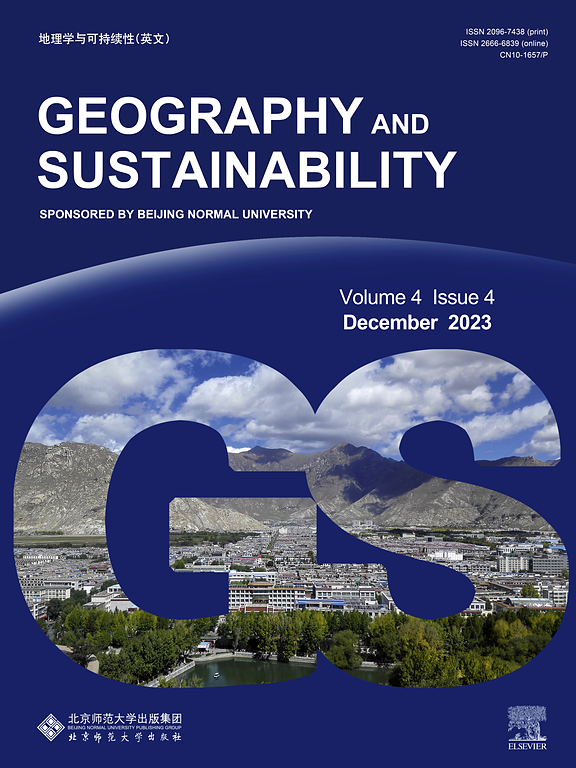Latitudinal gradients of biodiversity and ecosystem services in protected and non-protected oak forest areas can inform climate smart conservation
IF 8
1区 环境科学与生态学
Q1 GEOGRAPHY, PHYSICAL
引用次数: 0
Abstract
Adaptive governance of areas set aside for future protection of biodiversity, sustainable production, and recreation requires knowledge about whether and how effects of area protection are modulated by climate change and redistribution of species. To investigate this, we compare biodiversity of plants (assessed using vegetation plots) and arthropods (collected with Malaise traps, analyzed using metabarcoding) and productivity (tree growth, determined using dendrochronology) in protected and non-protected oak (Quercus spp.) forests along a latitudinal gradient (55.6 °N – 60.8 °N) in Sweden. We also compare historical, recent and projected future climate in the region. In contrast to established global latitudinal diversity gradients, species richness of plants and arthropods increased northwards, possibly reflecting recent climate-induced community redistributions, but neither was higher in protected than in non-protected areas, nor associated with contemporary ground temperature. Species composition of arthropods also did not differ between protected and non-protected areas. Arthropod biomass increased with latitude, suggesting that the magnitude of cascading effects mediated via their roles as pollinators, herbivores, and prey for other trophic levels, varies geographically and will change with a moving climate. Annual growth rate of oaks (an ecosystem service in the form of biomass increase and carbon sequestration) was independent of latitude and did not differ between protected and non-protected areas. Our findings question the efficacy of contemporary designation and management of protected oak forests, and emphasize that development and implementation of modified climate smart conservation strategies is needed to safeguard ecosystem functioning, biodiversity, and recreational values of protected forest areas against future challenges.

受保护和非受保护橡树林区生物多样性和生态系统服务的纬度梯度可为气候智能保护提供信息
要对为未来保护生物多样性、可持续生产和娱乐而预留的区域进行适应性治理,就必须了解气候变化和物种重新分布是否以及如何调节区域保护的效果。为此,我们比较了瑞典纬度梯度(55.6 °N - 60.8 °N)上受保护和未受保护的橡树(栎属)森林中的植物(通过植被地块评估)和节肢动物(通过马拉氏诱捕器收集,通过代谢编码进行分析)的生物多样性和生产力(树木生长,通过树木年代学确定)。我们还比较了该地区的历史气候、近期气候和预测的未来气候。与已确定的全球纬度多样性梯度相反,植物和节肢动物的物种丰富度向北增加,这可能反映了近期气候引起的群落重新分布,但保护区的物种丰富度均未高于非保护区,也与当代地面温度无关。节肢动物的物种组成在保护区和非保护区之间也没有差异。节肢动物的生物量随纬度的增加而增加,这表明节肢动物作为授粉者、食草动物和其他营养级的猎物所产生的级联效应的大小因地理位置而异,并将随着气候的变化而变化。橡树的年增长率(以生物量增加和碳封存的形式提供生态系统服务)与纬度无关,在保护区和非保护区之间也没有差异。我们的研究结果对当代指定和管理橡树保护林的有效性提出了质疑,并强调需要制定和实施经过修改的气候智能保护战略,以保护森林保护区的生态系统功能、生物多样性和娱乐价值,应对未来的挑战。
本文章由计算机程序翻译,如有差异,请以英文原文为准。
求助全文
约1分钟内获得全文
求助全文
来源期刊

Geography and Sustainability
Social Sciences-Geography, Planning and Development
CiteScore
16.70
自引率
3.10%
发文量
32
审稿时长
41 days
期刊介绍:
Geography and Sustainability serves as a central hub for interdisciplinary research and education aimed at promoting sustainable development from an integrated geography perspective. By bridging natural and human sciences, the journal fosters broader analysis and innovative thinking on global and regional sustainability issues.
Geography and Sustainability welcomes original, high-quality research articles, review articles, short communications, technical comments, perspective articles and editorials on the following themes:
Geographical Processes: Interactions with and between water, soil, atmosphere and the biosphere and their spatio-temporal variations;
Human-Environmental Systems: Interactions between humans and the environment, resilience of socio-ecological systems and vulnerability;
Ecosystem Services and Human Wellbeing: Ecosystem structure, processes, services and their linkages with human wellbeing;
Sustainable Development: Theory, practice and critical challenges in sustainable development.
 求助内容:
求助内容: 应助结果提醒方式:
应助结果提醒方式:


